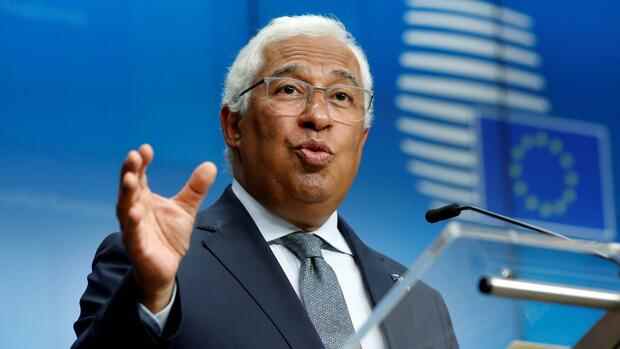Madrid Portugal is one of the poorest countries in Europe, but is far ahead of the big southern European countries in one crucial point: financial discipline. Socialist Prime Minister António Costa has based his policies over the past six years on the premise of balanced budgets.
With success: he turned the budget deficit of 4.4 percent in 2015 into a slight plus of 0.1 percent in 2019. And that without draconian austerity measures or slowed down growth, which was a result of the austerity policy decreed by the EU for a long time. National debt also fell significantly under Costa.
His actions took the rest of Europe by surprise. So much so that former German finance minister Wolfgang Schäuble (CDU) described Costa’s first finance minister, Mario Centeno, as the “Cristiano Ronaldo” of Europe’s finance ministers, in a nod to the Portuguese soccer star. Centeno soon became head of the Eurogroup.
But criticism grew among Costa’s left-wing supporters because of budgetary discipline: they refused him approval of the budget at the end of 2021, making new elections necessary, which will take place on January 30.
Top jobs of the day
Find the best jobs now and
be notified by email.
The election raises the question of what will happen to Portugal’s financial discipline if Costa is not re-elected prime minister. The lead of Costa’s socialists has continued to melt in recent weeks. Earlier this week, the largest opposition party, the conservative PSD, even just overtook the Socialists.
No election winner will give up fiscal discipline
However, experts in Portugal agree: Whoever takes over the government business – budgetary discipline will not be compromised. “Based on past experience, the population knows exactly how important balanced budgets are,” says economist Joao Cesar das Neves from the Catholic University in Lisbon. “Therefore no politician will dare to neglect it.”
The Portuguese are shaped by their experiences with excessive debt in the years after the financial crisis. They had ensured that Portugal had to be rescued from national bankruptcy in 2011. At the time, Portugal showed great understanding for the austerity decreed by the troika of the European Union (EU), International Monetary Fund (IMF) and European Central Bank (ECB) and in 2015 re-elected the conservative Prime Minister Pedro Passos Coelho, who had implemented painful austerity measures in the previous four years had.
Since he was unable to find a partner to form a government after the election, the socialist Costa took over and forged a completely unexpected alliance with two left-wing radical parties that actually didn’t like the Brussels austerity dictates. But they also supported politics for six years.
In an international comparison, Costa’s policies have given Portugal a decisive advantage: the country is in a better position than any other in southern Europe to pay off the mountain of debt that exploded during the pandemic. This is the result of a study by the Institute of Economics (IW), which compared the national debts of France, Italy, Spain, Greece and Portugal.
“A relatively positive image can be conveyed for Portugal,” it says. “In two of the three scenarios the debt ratio falls, in the third scenario it rises slightly. The reasons for the positive outlook are good GDP growth and the positive primary balance,” the authors summarize. The study confirms that only Greece will also be able to reduce its debt ratio over the next two decades – albeit not as much as Portugal. In France, Italy and Spain, on the other hand, government debt continues to rise in any macroeconomic scenario.
>> Read here: The euro has survived a lot of criticism – and is still a debt burden
Now, especially after the pandemic, which has led to higher government debt in all countries, the question arises as to whether Costa’s crisis recipe is a good example. He himself claims that he has found an alternative to austerity. With its severe spending cuts and tax increases after the financial crisis, it choked off growth and even led to a second recession in some countries.
Experts: Costa’s policies are damaging the country in the long term
But what Costa, who demonizes austerity at every opportunity, describes as an alternative, economists don’t see as an alternative at all: he has succeeded in reducing the deficit and debt while at the same time raising pensions and wages and cutting taxes. “But he accomplished this miracle with cosmetics, among other things,” says economist das Neves.
A large part has consisted of raising indirect taxes such as those on petrol or sugary drinks, or cutting public investments to a minimum. In addition, the strong global economy has ensured that Costa’s calculation worked.
“I wouldn’t see that as an alternative to austerity, but rather as a delay in the important structural reforms that the country needs,” agrees political scientist Filipe Teles from the University of Aveiro. “Costa made a very short-term policy that was well received by the population and won back the trust of the EU Commission,” says Rui Leão Martinho, head of the Portuguese Association of Economists. “But the lack of reforms and investments harms the country’s long-term development.”
The European recovery fund is perfect for this, from which Portugal will receive 13.9 billion euros in transfers and 2.7 billion in loans. Costa did not want more loans because of the high level of debt. “Costa or whoever wins the election is now forced to tackle reforms, otherwise the money from the reconstruction fund will not flow,” says the economist.
More: Failed draft budget: In Portugal, a government that was considered a role model in the EU is in danger of collapsing


